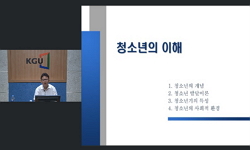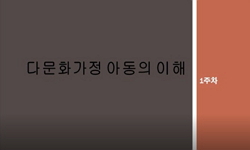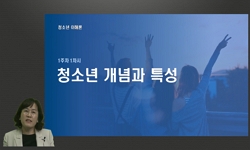According to the National Statistical Office (2006), it was estimated that in the year 2020 one out of five people under the age of 20 (21%) will be from multi-cultural families and one out of three (32%) newborn babies (32%) will be from multi-cultur...
http://chineseinput.net/에서 pinyin(병음)방식으로 중국어를 변환할 수 있습니다.
변환된 중국어를 복사하여 사용하시면 됩니다.
- 中文 을 입력하시려면 zhongwen을 입력하시고 space를누르시면됩니다.
- 北京 을 입력하시려면 beijing을 입력하시고 space를 누르시면 됩니다.
https://www.riss.kr/link?id=T12331763
- 저자
-
발행사항
광주 : 조선대학교 정책대학원, 2011
-
학위논문사항
학위논문(석사) -- 조선대학교 정책대학원 , 사회복지학 , 2011. 2
-
발행연도
2011
-
작성언어
한국어
- 주제어
-
DDC
362.7 판사항(21)
-
발행국(도시)
광주
-
형태사항
ⅵ, 85p. ; 26 cm
-
일반주기명
지도교수:김진숙
조선대학교 논문은 저작권에 의해 보호받습니다.
참고문헌 : p.80-85 - 소장기관
-
0
상세조회 -
0
다운로드
부가정보
다국어 초록 (Multilingual Abstract)
This article aims at emphasizing plans to maximize the capacity of the youth from multi-cultural families by helping them to cope with their lives through establishing the positive self identities and becoming significant assets in society, especially in Gwangju.
Programs to maximize the capacity of the youth are based on fundamental factors such as social, cultural, cognitive, emotional and civil capacities. Such factors are imperative in that they help establish desirable images, plan healthy, creative lives and undergo socialization process. However, programs to maximize the capacity of the youth from multi-cultural families should not be general and uniform but diversified in terms of their emotions, surroundings and social integration in the near future. In order to achieve these goals, multi-cultural families should be supported in the field ranging from national policy, educational institutes, local society to school education.
Today's multi-cultural families-related policy support plans from different government departments are quite similar in name and tend to be somewhat overlapping. They should be run in a unitary, integrated way within a single system combining such factors as manpower, material support, emotional support, educational support, welfare support, administrative support, nurturing support, youth support, etc. rather than unsystematic, impromptu support lacking professionalism. Accordingly, dedicated policy managers and experts for this field should be trained.
The youth from multi-cultural families tend to show confusion caused by their dual cultural identities, emotional instability, violent, non-normative behaviors and lack of personal relationships. Therefore programs for childhood and youth should have unified flow and connection.
Ehthics education for the sense of national identity should be provided for youth from multi-cultural families because compared with others, they need more the sense of nationalism and community spirit. Therefore, programs provided for youth from multi-cultural families by Gwangju Metropolitan City should be supplemented. Meanwhile, some of the 'programs for multicultural-based schools' at elementary schools funded by the Ministry of Education turn out to be a plain, tour-like cultural experience or exclusive program in which other parents and students feel discriminated. It is essential to create programs needed for national interest and national unity not by wasting money, but by training experts for the education of youth from multi-cultural families.
More local children's centers should be established to maximize the capacity of youth from multi-cultural families as well as bring satisfaction to mono-cultural and underprivileged families in the community. In addition, educational programs for parents of multi-cultural families, networking educational institutes in the local community, multicultural-related curriculum from education colleges, various club activities for multi-cultural youth, mentoring projects in conjunction with volunteer work, and textbooks available at schools are needed.
Maximizing the capacity of youth from multi-cultural families helps improve their bilingual, bicultural abilities, perform social obligations and duty, have an appropriate value of self identity and humanitarianism, and contribute to a peaceful international exchange socially.
According to the National Statistical Office (2006), it was estimated that in the year 2020 one out of five people under the age of 20 (21%) will be from multi-cultural families and one out of three (32%) newborn babies (32%) will be from multi-cultural families. Increasing numbers of youth from multi-cultural families will have a substantial influence on establishing a national identity and new societal culture; therefore, integrating those young people through programs designed to maximize their capacity is considered very important.
This article aims at emphasizing plans to maximize the capacity of the youth from multi-cultural families by helping them to cope with their lives through establishing the positive self identities and becoming significant assets in society, especially in Gwangju.
Programs to maximize the capacity of the youth are based on fundamental factors such as social, cultural, cognitive, emotional and civil capacities. Such factors are imperative in that they help establish desirable images, plan healthy, creative lives and undergo socialization process. However, programs to maximize the capacity of the youth from multi-cultural families should not be general and uniform but diversified in terms of their emotions, surroundings and social integration in the near future. In order to achieve these goals, multi-cultural families should be supported in the field ranging from national policy, educational institutes, local society to school education.
Today's multi-cultural families-related policy support plans from different government departments are quite similar in name and tend to be somewhat overlapping. They should be run in a unitary, integrated way within a single system combining such factors as manpower, material support, emotional support, educational support, welfare support, administrative support, nurturing support, youth support, etc. rather than unsystematic, impromptu support lacking professionalism. Accordingly, dedicated policy managers and experts for this field should be trained.
The youth from multi-cultural families tend to show confusion caused by their dual cultural identities, emotional instability, violent, non-normative behaviors and lack of personal relationships. Therefore programs for childhood and youth should have unified flow and connection.
Ehthics education for the sense of national identity should be provided for youth from multi-cultural families because compared with others, they need more the sense of nationalism and community spirit. Therefore, programs provided for youth from multi-cultural families by Gwangju Metropolitan City should be supplemented. Meanwhile, some of the 'programs for multicultural-based schools' at elementary schools funded by the Ministry of Education turn out to be a plain, tour-like cultural experience or exclusive program in which other parents and students feel discriminated. It is essential to create programs needed for national interest and national unity not by wasting money, but by training experts for the education of youth from multi-cultural families.
More local children's centers should be established to maximize the capacity of youth from multi-cultural families as well as bring satisfaction to mono-cultural and underprivileged families in the community. In addition, educational programs for parents of multi-cultural families, networking educational institutes in the local community, multicultural-related curriculum from education colleges, various club activities for multi-cultural youth, mentoring projects in conjunction with volunteer work, and textbooks available at schools are needed.
Maximizing the capacity of youth from multi-cultural families helps improve their bilingual, bicultural abilities, perform social obligations and duty, have an appropriate value of self identity and humanitarianism, and contribute to a peaceful international exchange socially.
국문 초록 (Abstract)
본고에서는 다문화가정 청소년들이 긍정적 자아 정체성을 가지고 삶에 잘 대처하며 사회적 기량을 펼쳐나가는데 있어 중요한 지지 기반이 될 수 있는 그들의 역량강화방안에 대해 광주광역시를 중심으로 살펴보았다.
청소년을 위한 역량강화 프로그램은 사회적 역량, 문화적 역량, 인지적 역량, 정서적 역량, 시민적 역량 등을 기본요소로 하고 있는 것으로 나타났다. 이러한 요소는 바람직한 청소년상을 정립하고 건전하고 창조적인 삶을 계획하고 사회화과정을 형성해가는 중요한 축이라는 점에서 중요하다. 하지만 다문화가정 청소년의 역량강화 프로그램은 일반적이고 획일적인 것이 아닌, 그들의 정서와 가정적 환경 그리고 장차 사회 통합적 측면에서 차별화 할 필요가 있고 국가정책, 유관교육기관, 지역사회, 학교교육으로까지 연계되어 협력 교육이 이루어져야 한다.
현재의 다문화가정 정책에 있어서 그 지원계획과 내용이 국가부처별 명칭도 유사하고 중복적인 양상을 보인다. 전문성이 결여된 무체계적이고 즉흥적인 시혜성의 지원보다는 하나의 시스템 안에서 인적 지원, 물적 지원, 정서적 지원, 교육지원, 복지지원, 행정지원, 양육지원, 청소년지원 등을 일원화하여 통합적으로 운영되어야 한다. 이를 위해서는 전담 전문가를 양성하고 실무자의 역량 강화를 위한 교육이 필요하며 나아가 국가적 관리 및 평가가 필요하다.
다문화가정 청소년은 아동기 때부터 상호작용 및 대인관계 회피, 비규범적인 양태, 문화적 정체성의 대립, 행동․심리적 문제, 높은 불안 및 폭력성을 보인다는 연구내용이 있다는 점에서 아동기와 청소년기를 연계하는 정책을 행해야 한다. 또한 그들은 일반학생에 비해 시민의식과 국가민족 공동체의식이 많이 결여된다는(조응태, 2006) 점에서, 국가정체성을 기르는 도덕교육이 시급하다. 더욱이 결혼이주민의 대부분이 공산국가였거나 현재 공산국가(캄보디아, 몽골, 베트남, 중국, 라오스)라는 점에서 더욱 그러하다. 광주광역시에서 행하는 다문화가정 청소년을 위한 역량강화 프로그램도 앞으로 이러한 점이 보완되어야 할 것으로 보인다.
다문화가정 청소년의 역량강화 프로그램의 활성화는 다문화사회에 있어서 사회 통합적 측면, 문화적 융합을 기하기 위해서라도 중요한 작업이라고 할 수 있다. 이를 위해서는 단순한 문화체험이나 취미생활의 지원에 그치는 것이 아닌, 지역아동센터의 지원확대, 다문화가정 부모의 자녀 교육프로그램개발, 지역청소년 통합지원체계와 연계, 지역 교육기관과의 연계 및 활성화를 위한 네트워크 구축, 사범대 및 교대의 다문화 관련 교과과정 신설, 동아리활동, 봉사활동과 연계하는 멘토링 사업, 학교교육에서 운용할 수 있는 프로그램 활성화 및 확대실시가 필요하다.
다문화가정 청소년의 역량을 강화시킴으로서 그들의 이중 언어문화 자원과 같은 능력도 극대화되고, 사회적 책임과 의무, 자기정체성 및 인도주의에 대한 올바른 가치관을 정립하여 평화적인 국가교류를 위한 사회적 자원으로 활약할 수 있을 것이다.
현재 한국 내에 거주하는 외국인은 합․불법 합쳐 약 120만으로 우리나라 인구의 2.2%(행안부, 2009.7)에 해당한다. 그리고 국내 전체 결혼 중 국제결혼의 비중은 2009년 현재 10.8%이다. 통계...
현재 한국 내에 거주하는 외국인은 합․불법 합쳐 약 120만으로 우리나라 인구의 2.2%(행안부, 2009.7)에 해당한다. 그리고 국내 전체 결혼 중 국제결혼의 비중은 2009년 현재 10.8%이다. 통계청(2006)에 의하면 2020년에는 20세 이하 인구 5명중 1명(21%)이 다문화 가정의 자녀가 되고, 신생아 3명중 1명(32%)이 다문화가정 자녀가 될 것으로 추정할 만큼 다문화가정은 급증하고 있다. 이러한 다문화가정 청소년의 증가는 우리나라의 국가정체성과 새로운 사회문화를 형성하고 통합하는데 큰 영향을 미친다고 할 때 다문화가정 청소년의 역량강화 프로그램은 매우 중요하다.
본고에서는 다문화가정 청소년들이 긍정적 자아 정체성을 가지고 삶에 잘 대처하며 사회적 기량을 펼쳐나가는데 있어 중요한 지지 기반이 될 수 있는 그들의 역량강화방안에 대해 광주광역시를 중심으로 살펴보았다.
청소년을 위한 역량강화 프로그램은 사회적 역량, 문화적 역량, 인지적 역량, 정서적 역량, 시민적 역량 등을 기본요소로 하고 있는 것으로 나타났다. 이러한 요소는 바람직한 청소년상을 정립하고 건전하고 창조적인 삶을 계획하고 사회화과정을 형성해가는 중요한 축이라는 점에서 중요하다. 하지만 다문화가정 청소년의 역량강화 프로그램은 일반적이고 획일적인 것이 아닌, 그들의 정서와 가정적 환경 그리고 장차 사회 통합적 측면에서 차별화 할 필요가 있고 국가정책, 유관교육기관, 지역사회, 학교교육으로까지 연계되어 협력 교육이 이루어져야 한다.
현재의 다문화가정 정책에 있어서 그 지원계획과 내용이 국가부처별 명칭도 유사하고 중복적인 양상을 보인다. 전문성이 결여된 무체계적이고 즉흥적인 시혜성의 지원보다는 하나의 시스템 안에서 인적 지원, 물적 지원, 정서적 지원, 교육지원, 복지지원, 행정지원, 양육지원, 청소년지원 등을 일원화하여 통합적으로 운영되어야 한다. 이를 위해서는 전담 전문가를 양성하고 실무자의 역량 강화를 위한 교육이 필요하며 나아가 국가적 관리 및 평가가 필요하다.
다문화가정 청소년은 아동기 때부터 상호작용 및 대인관계 회피, 비규범적인 양태, 문화적 정체성의 대립, 행동․심리적 문제, 높은 불안 및 폭력성을 보인다는 연구내용이 있다는 점에서 아동기와 청소년기를 연계하는 정책을 행해야 한다. 또한 그들은 일반학생에 비해 시민의식과 국가민족 공동체의식이 많이 결여된다는(조응태, 2006) 점에서, 국가정체성을 기르는 도덕교육이 시급하다. 더욱이 결혼이주민의 대부분이 공산국가였거나 현재 공산국가(캄보디아, 몽골, 베트남, 중국, 라오스)라는 점에서 더욱 그러하다. 광주광역시에서 행하는 다문화가정 청소년을 위한 역량강화 프로그램도 앞으로 이러한 점이 보완되어야 할 것으로 보인다.
다문화가정 청소년의 역량강화 프로그램의 활성화는 다문화사회에 있어서 사회 통합적 측면, 문화적 융합을 기하기 위해서라도 중요한 작업이라고 할 수 있다. 이를 위해서는 단순한 문화체험이나 취미생활의 지원에 그치는 것이 아닌, 지역아동센터의 지원확대, 다문화가정 부모의 자녀 교육프로그램개발, 지역청소년 통합지원체계와 연계, 지역 교육기관과의 연계 및 활성화를 위한 네트워크 구축, 사범대 및 교대의 다문화 관련 교과과정 신설, 동아리활동, 봉사활동과 연계하는 멘토링 사업, 학교교육에서 운용할 수 있는 프로그램 활성화 및 확대실시가 필요하다.
다문화가정 청소년의 역량을 강화시킴으로서 그들의 이중 언어문화 자원과 같은 능력도 극대화되고, 사회적 책임과 의무, 자기정체성 및 인도주의에 대한 올바른 가치관을 정립하여 평화적인 국가교류를 위한 사회적 자원으로 활약할 수 있을 것이다.
목차 (Table of Contents)
- ABSTRACT
- 제 1장 서론 1
- 제 1절 연구 목적 1
- 제 2절 연구범위 및 방법 3
- ABSTRACT
- 제 1장 서론 1
- 제 1절 연구 목적 1
- 제 2절 연구범위 및 방법 3
- 제 2장 이론적 배경 6
- 제 1절 다문화가정의 이해 6
- 제 2절 다문화가정 청소년의 현황 12
- 제 3절 다문화가정 청소년의 역량강화 16
- 1. 역량강화의 개념 16
- 2. 역량강화의 요소 19
- 제 4절 역량강화의 필요성 22
- 제 3장 광주광역시의 다문화가정 자녀의 역량강화 26
- 제 1절 다문화가족지원센터의 프로그램 26
- 제 2절 광주광역시 교육청의 다문화가정 학생을 위한 방안 28
- 1. 다문화가정 학생의 교육 계획 방안 28
- 2. 광주광역시 교육청 선정 ‘다문화중심학교’의 교육 프로그램 36
- 3. 지역사회의 연계 프로그램 54
- 제 4장 다문화가정 청소년의 역량강화 방안 56
- 제 1절 다문화가정의 정책적 문제 56
- 1. 정부부처의 중복지원의 문제 56
- 2. 다문화청소년을 위한 프로그램 개발과 도덕교육 62
- 3. 합법 다문화가정에 반감과 차별 조장하는 불법 체류자 근절 필요 64
- 제 2절 다문화청소년의 역량강화를 위한 방안 65
- 제 5장 결론 78
- 참고문헌 80












